In a move that underscores escalating tensions in the region, Kim Jong Un announced the deployment of “special assets” by North Korea in response to what he described as an arms build-up by the United States in South Korea. This statement was reported by state media, The Korean Central News Agency (KCNA), which detailed Kim’s comments during a speech at a weapons exhibition in Pyongyang.
The United States maintains a military presence of approximately 28,500 troops in South Korea, a strategic effort aimed at countering potential military threats from the nuclear-armed North. Recently, the U.S., in collaboration with its allies South Korea and Japan, conducted joint military exercises that North Korea routinely condemns as practice for invasion. The allies, however, assert that these exercises serve purely defensive purposes.
During his speech, Kim expressed concerns about what he characterized as the rapid progression of the U.S.-Republic of Korea (ROK) nuclear alliance, emphasizing the variety of military drills being conducted to prepare for “dangerous scenarios.” He articulated a growing strategic concern regarding military activities in the region, stating, “In direct proportion to the US military’s arms buildup in the ROK region, our strategic concern about this region has also grown, and accordingly we have assigned our special assets to the major targets.” Although Kim did not specify what these “special assets” entail, he asserted that he was “closely watching” ongoing military developments across the border.
Photographs distributed by KCNA featured Kim inspecting various weapons, including missiles, alongside North Korean generals in the exhibition hall, reinforcing the regime’s focus on military capability.
In a notable shift, Kim mentioned last month his willingness to engage in talks with the United States, recalling “fond memories” of his interactions with former President Donald Trump. This openness was conditional on North Korea’s retention of its nuclear arsenal. Kim and Trump held three high-profile summits during Trump’s presidency, but negotiations collapsed in Hanoi in 2019 over disputes regarding the concessions North Korea was willing to make concerning its nuclear weapons.
The longstanding demand from the U.S. for North Korea to relinquish its banned weapons has been a significant point of contention between the nations. As North Korea continues to face stringent sanctions from the United Nations aimed at curtailing its nuclear and missile advancements, the regime has repeatedly reiterated its stance against denuclearization, labeling itself an “irreversible” nuclear state since the breakdown of talks in 2019.
















